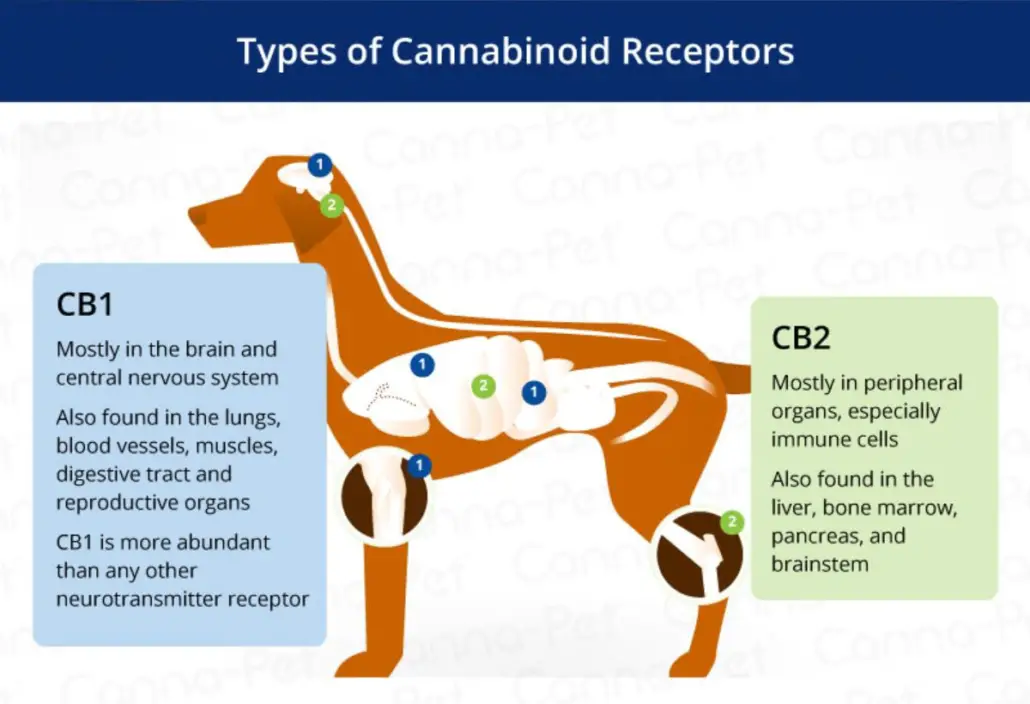The Definitive Guide to CBD for Dogs

As a dog owner, you’d do anything to help your little pup. From picking up behind them on walks to letting them take up the whole bed, you already go out of your way to make them happy.
Of course, our love and care extends to their health and well-being. During a recent veterinary check-up, you might have been tempted to ask your dog’s vet about CBD.
Maybe little Rex suffers from separation anxiety, and you’ve heard whispers about a hemp-based natural treatment. Maybe your doggo is growing older, and you’re working to help them age as actively as possible.
Whatever the reason, you can’t fault your curiosity. CBD seems to be around every corner.
Whether you take CBD yourself, or have a friend who won’t shut up about it, CBD’s popularity in humans has skyrocketed.
It’s widely known to treat sleep disorders, pain and arthritis, general malaise, anxiety, skin conditions, and so much more.
But can CBD do the same for your pets? More importantly, is it even safe for them to take? We answer these questions and more in our definitive guide to CBD for dogs.
What is CBD, anyway?
CBD is short for cannabidiol, one of the molecules present in cannabis.
Extracted from its parent plant, Cannabis sativa, it offers a ton of benefits to the endocannabinoid system. CBD differs from THC, the compound known to cause a high in marijuana.
As most CBD products are extracted from hemp, it’s highly unlikely that any CBD will contain traces of CBD at all. Hemp is required by law to contain no more than 0.3% THC in total.
That’s great news for your dogs, as you’re not trying to get them high. Instead, CBD interacts with their natural endocannabinoid system to treat all kinds of conditions.
The Endocannabinoid System In Dogs

Did you know that dogs already have cannabinoids within their bodies?
These internal compounds, called endocannabinoids, work much like any hormone.
They’re released and received by CB1 and CB2 receptors to control homeostasis. As CBD closely mimics these compounds, giving it to your dog yields similar reactions.
This dynamic system of endocannabinoids was discovered only a few decades ago, meaning we’re just scratching the surface of its potential.
We do know that CBD’s interaction with the endocannabinoid system shows positive results for mood, pain management, and overall well-being.
As cannabis becomes less taboo and we understand more about its benefits, veterinarians all around the world are using CBD in healthcare. Let’s go over some of the ways CBD can help your pet.
How CBD Can Help Dogs
CBD works similarly for dogs as it does in humans.
It’s a calming agent for anxiety or aggression, it can help regulate appetite, and it counteracts inflammation.
Because research is so new on CBD, we’re constantly learning more about its benefits for dogs. For now, however, we know it can offer the following benefits for dogs:
- Reduced pain, especially in joints
- Relief from separation anxiety
- Calmer moods to combat aggression or excessive barking
- Cancer recovery
- Seizure treatment
- Appetite regulation for under/overeating
- Anti-nausea agent
But how does it work? Like most things, CBD impacts the body in a variety of ways.
Depending on your dog’s condition, dose, age, and more, it sets off one of many interactions to alleviate symptoms.
But before we dive into individual benefits, let’s get to the question at the front of every dog owner’s mind – is CBD safe for dogs?
Is CBD Safe for Dogs?
As of this writing, moderate, veterinary-supervised use of CBD has shown zero safety issues.
Exogenous cannabinoids only increases levels of cannabinoids that already exists within your pup’s body. All of the research show far shows little to no adverse effects of pure CBD in dogs.
One study on CBD administration to 30 beagles did produce short-term diarrhea, however.
And the researchers took care to note that we still don’t know the long-term effects of chronic CBD use, in either dogs or humans.
Unfortunately, our weird relationship with cannabis has limited scientists’ ability to dive as deep into this research as we’d like.
So it’s definitely something to pay attention to in the coming years. On a positive note, the large majority of research we do have has been conducted on animals.
While it’s tough to extrapolate that data to humans, we can be confident it holds true in animals.
If a risk of mild diarrhea is as bad as it gets, that’s a great sign. Don’t forget- most pharmaceutical interventions for dogs are rife with potential side effects.
Regardless, always consult with your veterinarian before starting regular treatment for any condition.
CBD for Cancer in Dogs
Cancerous cells come from irregular mutations.
While we’re still searching for the cure, maintaining homeostasis within the body helps mitigate potential cancerous growths.
CBD has even been shown to contribute to cancerous cell death in rats and mice. For further confirmation, researchers took this test to human subjects.
There, scientists found that CBD induces programmed cell death in cases of human breast cancer.
Furthermore, CBD can help ameliorate some of the downsides of chemotherapy.
As chemo remains one of the best treatments for cancer, making it more tolerable is a blessing.
Use of CBD after chemo can reduce the neuropathic pain that regularly follows treatment.
And if you could keep Stella out of pain while she recovers, wouldn’t you want to?
Can CBD help treat epilepsy and seizures?
I have to admit – I’m a bit biased on this one.
My dog, a 7-year-old lab/German shepherd mix actually suffers from epilepsy, and I give him CBD as part of his treatment.
When the price of his prescription pills became too high to manage, I reached for a veterinary-approved CBD oil.
It worked for him, so I love it. Still, he’s just one dog, and one specific case.
I recognize that every pet is different. As seizures are terrifying to witness, and definitely worse for him to experience, I wouldn’t recommend it lightly. But the literature definitely backs it up.
Out of all of the exciting benefits of CBD, epileptic seizure treatment has the most legs in research.
Multiple studies confirm that regular treatment with CBD can reduce both the frequency and severity of seizures.
Research in rats suggests that CBD’s effects on inhibitory neurotransmitters contribute to its anti-epileptic qualities.
With so much promise and so little side effects, be sure to consult with your vet about treatment.
They’ll be able to provide professional guidance on dosage, method of administration, and appropriate length of treatment.
CBD Oil for Anxiety and Depression
Much like humans, our dogs can suffer from depression and anxiety.
Whether it’s a frenzy every time you leave the house, a lack of desire to play, or simply fearing thunderstorms, CBD can help.
Both of these conditions are mood disorders, stemming from hormonal imbalances or situational stressors.
Since the endocannabinoid system regulates mood and neurotransmitter release, it’s activity regulates anxiety and depression.
CBD modulates receptors within the brain, controlling the release of norepinephrine and epinephrine, two hormones associated with the “fight or flight” response.
Activity of either of these hormones leads to situational anxiety, and chronic stimulation results in systemic, long-term anxiety disorders.
CBD helps recalibrate everything for your dog so the little one can get back to relaxing on the couch.
CBD also corresponds with serotonin and dopamine receptors. In high enough doses, CBD triggers feelings of happiness through serotonin modulation.
By altering the shape of these binding sites, CBD counteracts depressive states, helping your pupper return to their happy selves.
The Arthritic Dog – Treating Joint Pain with CBD
As dogs get older, years of frolicking in the fields catches up with them.
Many dogs develop arthritis in their hips, while others just lose that pep in their step.
Even though us humans just pop an ibuprofen after a long day of activity, these pain meds are poisonous to dogs.
Therefore, our pets need something else to ease their pain.
CBD targets a specific area in the body that processes pain, the vanilloid receptor.
These receptors send painful signals to the brain during instances of injury or over-inflammation.
Research indicates that CBD can regulate these receptors, keeping the painful signals at bay. By temporarily blocking the signal, CBD works to alleviate symptoms of arthritis.
This doesn’t mean your dog won’t feel a broken leg. Rather, minor, chronic pains can be mediated through regular use of CBD.
CBD for Insomnia
As noted above, CBD provides great stress management.
While stress is logically related to less sleep, it’s difficult to prove in a lab, as there are so many confounding variables.
One study showed moderate sleep impairment over three days of high stress. Another suggests that an individual’s coping style has more to do with sleep quality during stressful periods.
And finally, one study showed stress management treatments reduced reliance on pharmaceuticals for sleep quality in a select population.
As insomnia often results from stress, it makes sense that anxiety and stress reduction help.
Pre-sleep arousal, in particular, is associated with nighttime wakefulness. By mitigating the stress response at its origin, CBD lowers arousal levels.
Its effects on dopamine can elicit positive feelings of tranquility. For many, it serves as its own stress management tool to cure insomnia.
Ways To Take CBD For Dogs
Could your dog benefit from a little CBD? Probably.
But how should we feed Fido this magical elixir? We all know our pups can be a bit finicky when it comes to medication.
Tucking it in treats or hiding it within their food doesn’t always work. Is CBD any different? As it turns out, yes.
CBD oils and tinctures for dogs
Delivered in a small dropper, CBD oils and tinctures for dogs are the most common, most potent ways to administer CBD to your dog.
Just a few drops on their favorite food ensure they’ll get their daily dose. Sometimes, however, you need to directly drop them in your dog’s mouth, so good luck with that.
But unlike pills, they can’t sneakily spit the medication out when you’re not looking.
As far as efficacy goes, tinctures and oils are the way to go. They come in full-spectrum, broad-spectrum, and isolate versions.
Full-spectrum, while still derived from hemp, takes no mind to the THC content.
Therefore, your dog might get a trace amount of THC in their tincture. This isn’t necessarily a bad thing, given that hemp barely features THC at all.
Plus, the entourage effect brought upon by multiple cannabinoids can enhance the effects of CBD. However, if you have a small, sensitive dog, it’s not worth the risk.
Always ask a vet before beginning ANY sort of regular medical intervention.
CBD Pills/Capsules
The honest truth – you’ll run into the same issues giving these to your dog as you would any other medication.
They probably won’t be super eager to swallow it. Pill pockets and sneaky placement within food are your best bet.
They’re similar to tinctures and oils, just contained within an outer layer for direct distribution in the digestive tract.
CBD treats
Did someone say treats?!
You know your dog perks up the second you reach for anything that crinkles. CBD-infused treats can be a great way to treat your dog to holistic health.
Obviously, these snacks contain other ingredients, so triple check the label for anything you don’t want your dog consuming.
Most pet CBD brands value natural ingredients, however, so don’t shy away from this method.
Just know it’ll take a bit longer for the effects to hit as your dog digests multiple things at once. But for long-term administration, using treats isn’t a bad idea.
Conclusion
As CBD research continues, more benefits of CBD for dogs are sure to emerge.
For now, us pet owners can rest easy knowing that an effective, holistic treatment exists in this plant-based compound. To learn more about how CBD can help your dog, check out this YouTube video.
Here’s to many more years of tail-chasing, barking at mailmen, and sniffing butts.


